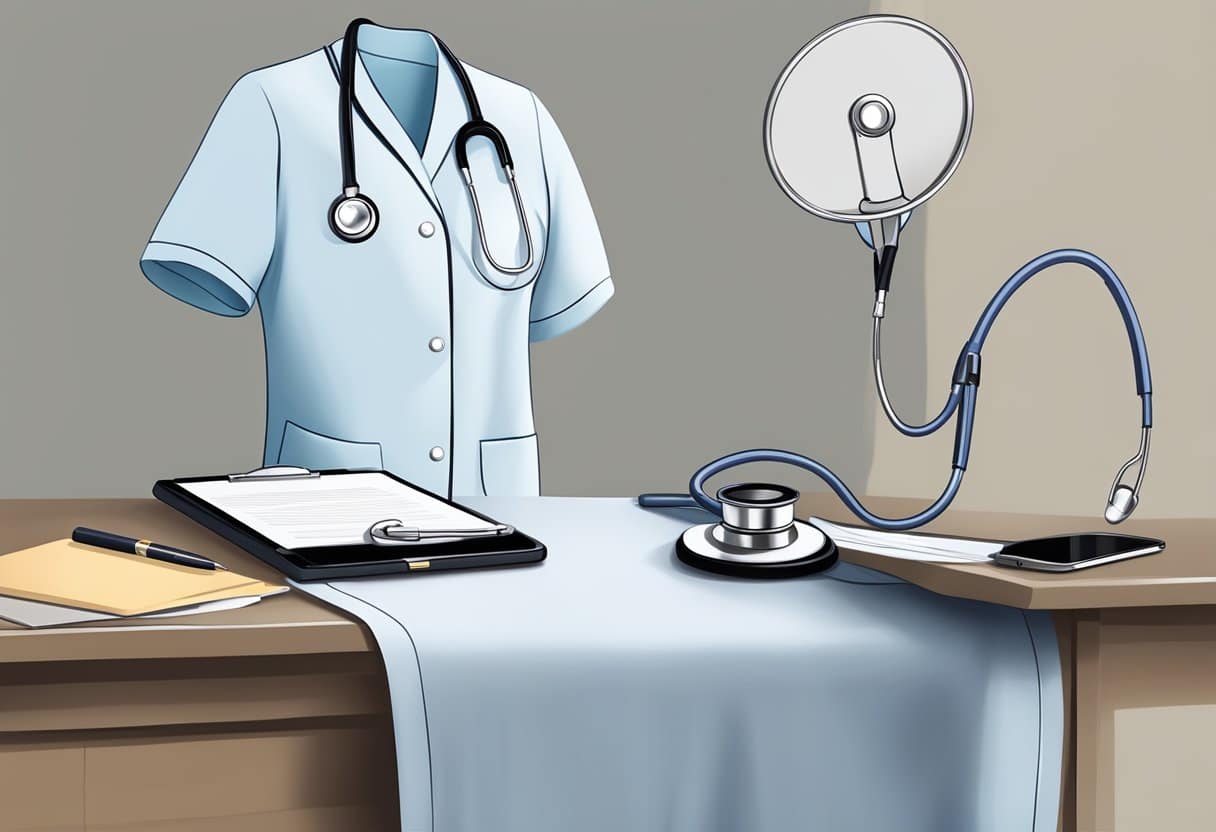Writing a solid nursing cover letter might just be your ticket to landing that first RN job or getting into a nurse residency program. A well-written cover letter can set you apart—showing off your skills, your genuine passion for nursing, and your eagerness to jump into a clinical team. If you’re looking for a practical Nursing Cover Letter Sample for Residency or New Grad RN positions, you’re in the right place. Let’s dig in and help you make a memorable impression.

A lot of new nurses stress about their lack of experience, but honestly, a thoughtful cover letter can really help fill those gaps. You can highlight your education, clinical rotations, and what makes you tick as a nurse. If you’re not sure how to pull that off, check out some cover letter templates—they’ll show you how to get your point across without sounding stiff.
And hey, if you want to save time (who doesn’t?), tools like RoboApply can whip up custom cover letters and help you apply to jobs on LinkedIn, Indeed, and more. Give RoboApply a shot for free—it might just boost your job hunt.
Understanding the Importance of a Nursing Cover Letter
A nursing cover letter isn’t just a box to check off—it’s your shot at showing hiring managers how you’d fit in with their team and the hospital’s values. If you write with intention, you’ll stand out from a crowd of applicants with similar backgrounds.
Role in the Application Process
Usually, the cover letter is the first thing a recruiter or nurse manager will see. It’s your chance to introduce yourself, share what motivates you, and show some real excitement for the job. Unlike a resume, this is where you explain why you want this position and how your vibe matches the organization’s mission.
It’s also a place to address any weak spots, like not much work experience or a career change. New grads can talk about clinical rotations in detail or share positive feedback from preceptors—those details can set a reassuring tone for your whole application.
Tailoring each cover letter for the hospital or residency program—maybe mentioning their patient population or something you admire about their approach—shows you’ve done your homework. Tools like Try RoboApply for free can speed things up, letting you automate the basics and focus on what matters.
Difference from a Resume
A resume? That’s just facts: degrees, dates, job titles. The cover letter, though, is where you get personal. You can explain your choices, highlight specific clinical experiences, or tell a quick story that shows, say, your empathy or how you work on a team. This helps hiring managers get a sense of who you are—beyond just your credentials.
For example, instead of just listing a pediatric rotation, the cover letter could mention how you learned to comfort anxious parents or handled a tricky situation. That’s the sort of thing that sticks.
Everything you write should add something new—not just repeat your resume. Simple, direct language is best; no one wants to slog through a wall of text, especially when they’re busy.
Connecting Credentials to Patient Care
A good cover letter ties your credentials directly to better patient care. Don’t just rattle off skills—explain how your training and clinical experiences will help you support patients from day one. For example, talking about hands-on wound care or your attention to medication safety shows you’re ready for the real world.
You might write, “During my ICU rotation, I learned to communicate clearly during emergencies,” or “I kept a detailed log of medication side effects to help the unit stay safe.” Those kinds of specifics show you’re not just book-smart—you’re ready to hit the ground running.
If you can connect your experiences to the hospital’s values or patient population, even better. There are tools like Try RoboApply for free that make it easier to match your letter to the job’s requirements and standards.
Essential Elements of a New Grad RN Cover Letter
A well-crafted cover letter for a new grad RN or residency spot is your best bet for getting noticed in a competitive field. If you organize your letter to show off your strengths, skills, and what drives you, you’ll have a much better shot at landing that interview.
Highlighting Qualifications as a Nursing Student
Start strong by stating your recent educational achievements. Mention your nursing degree, the program, and when you graduated (or will graduate). If you earned honors or kept your GPA high, toss that in—but don’t go overboard.
Try to connect your coursework or specific learning to what the residency needs. Maybe you joined student organizations, attended relevant workshops, or took on leadership roles—those bits show you’re committed.
For example:
Graduating with a Bachelor of Science in Nursing from State University in May 2025, she excelled in clinical rotations and was an active member of the Student Nurses Association. Her coursework in pediatrics and patient-centered care have provided a strong foundation for delivering safe, effective nursing care.
Demonstrating Clinical Experience and Skills
Even if you haven’t worked as an RN yet, every clinical rotation, internship, or hands-on training counts. Mention the types of units you’ve worked in—med-surg, peds, labor and delivery, emergency—and talk about the skills you picked up along the way.
A quick bulleted list can make your skills pop:
Example Clinical Skills:
- Assisted in wound care management and post-op monitoring
- Performed vital signs assessment for up to 10 patients per shift
- Maintained accurate electronic health records using Epic
- Provided discharge teaching for surgical patients
This straightforward approach reassures employers that you’ve already picked up some real-world skills. If you’re stuck, check out Nursing Cover Letter Made Easy for more ideas.
Showcasing Compassionate Care and Enthusiasm
Showing real care for patients is at the heart of nursing. Try to write about a time you communicated with empathy, kept your cool in a stressful moment, or supported a patient or family through something tough.
Stories help here. For example:
During a cardiology rotation, he supported an anxious patient before surgery by listening actively and explaining each step of the process. This compassionate care earned positive feedback from both the patient and supervising nurse.
Let them know you’re genuinely excited to join their team and that you care about their mission. That mix of heart and enthusiasm is what makes a new nurse stand out.
Tailoring Content to RN Residency Programs
Customizing your cover letter for each RN residency program isn’t just a nice touch—it shows you’re detail-oriented and serious. Name the program, mention their values, and point out anything unique from the job posting.
Explain why you’re drawn to this particular residency. Maybe it’s their mentorship, a unique training focus, or a specialty area that excites you. If your goals align with their mission, say so.
Some quick ways to customize:
- Use the residency program’s exact name
- Share how your career goals fit their program
- Mention what’s unique about this facility or team
- Address any special skills or qualities from the job posting
Tools like RoboApply can help you keep track and tweak your letters as you apply. Try RoboApply for free if you want to save time and stay organized.
Structuring Your Nursing Cover Letter
A strong nursing cover letter can really help you get noticed as a new grad or residency applicant. You’ll want to follow a clear structure that lets the hiring manager quickly see who you are, what you’ve done, and why you’re excited about the job.
Introduction and Personal Statement
Start with a direct greeting—if you know the hiring manager’s name, use it (“Dear Ms. Smith”). If not, “Dear Hiring Manager” works just fine.
Right up front, state why you’re writing. For example:
I am writing to express my interest in the Nurse Residency position at City Hospital. I recently graduated from the Villanova University College of Nursing with a Bachelor of Science in Nursing in May 2025.
Mention your school, your degree, and your graduation date early on. A couple of sentences about why you want to work at that specific facility or unit can help prove you’re not just sending out a generic letter.
Body: Detailing Clinical Experiences and Achievements
This is where you get into the good stuff—your clinical experiences and any standout achievements. Give concrete examples that help you stand out.
Bulleted lists work well here:
- Completed a 120-hour clinical rotation in the Intensive Care Unit (ICU), developing strong patient assessment and IV placement skills.
- Received the Nursing Clinical Excellence Award for outstanding performance during pediatrics rotation.
- Worked as a student nurse extern at Main Street Hospital, assisting with daily care for a diverse patient population.
Tie your skills to your achievements: “These rotations helped me become a better team player and communicator.” Make sure everything you mention relates back to the job you want. For more inspiration, peek at a nursing cover letter sample for residency/new grad RN.
Conclusion and Call to Action
Wrap things up by restating your interest and inviting the reader to reach out. Thank them for their time and consideration—keep it polite but don’t overthink it.
For example:
Thank you for considering my application for the Nurse Residency Program. I am excited about the possibility of beginning my nursing career with your team and am available for an interview at your earliest convenience.
Mention if you’ve attached your resume or references. Sign off with something professional, like “Sincerely” or “Best regards,” and your name.
If you want to save some time and hassle, you can use tools to draft and refine your cover letters or track your applications. Try RoboApply for free to make the process smoother and get those applications out faster.
Highlighting Clinical Experience and Skills
Employers want to see that new grad nurses can translate their clinical experience into real value on the job. Clear, specific examples help hiring managers picture you stepping into a nurse residency or entry-level RN role and making a difference right away.
Describing Rotations in Acute Care Settings
Clinical rotations in acute care are where new nurses really get their feet wet. It helps to paint a clear picture of the units, shifts, and types of patients you handled. For instance:
Finished a 12-week stint in a hectic emergency department—jumped in on trauma care, did rapid assessments, and helped triage patients. Took care of folks with chest pain, stroke symptoms, and other urgent conditions, always with a preceptor nearby.
Sometimes, a simple table lays out your experience better than a paragraph:
| Unit | Key Responsibilities | Skills Developed |
|---|---|---|
| Emergency Dept | Triage, wound care, IVs | Critical thinking, prioritization |
| Adult ICU | Monitor unstable patients | Assessment, communication |
Being specific here lets employers see you’re not just listing buzzwords—you’ve actually done the work.
Discussing Experience in Pediatrics, NICU, and Med-Surg
Spending time in pediatrics, the NICU, or med-surg proves you can adapt and handle specialized care. Try something like:
Logged 96 clinical hours in pediatric oncology—handled meds, educated patients, and supported families during chemo. In the NICU, I fed preemies, kept tabs on vitals, and charted everything.
A cover letter might include:
In my med-surg rotation, I cared for post-op patients, managed wound dressings, did pain checks, and gave IV meds. I learned to spot early signs of trouble and worked closely with all sorts of teams.
Employers are drawn to real-life examples over vague claims—it just feels more trustworthy.
Emphasizing Nursing Skills Developed During Clinical Hours
New grads should call out the hands-on skills they picked up. Things like:
- IV therapy, phlebotomy, and giving meds
- Infection control and sterile technique
- Teaching patients and families
- EHR documentation
A sample cover letter might say:
Across 450 clinical hours, I built strong assessment and patient communication skills. I regularly walked patients through medication side effects and discharge instructions, plus got pretty comfortable with venipuncture and IV starts for both kids and adults.
If you’re tired of slogging through applications, digital tools with templates and resume scoring can speed things up. RoboApply is free and easy to try.
Standing Out as a New Graduate Nurse
Hiring managers want to see sharp problem-solving, a willingness to adapt, and a team-first attitude. New grads can stand out by sharing specific stories, showing some optimism, and including positive feedback from instructors or preceptors.
Demonstrating Critical Thinking Skills
Critical thinking is a must-have for new nurses. Employers need to know you can assess patients, spot changes, and make safe calls—even if you’re new. In your cover letter, don’t just say you’re a critical thinker; show it with a real situation from clinicals or simulations.
For example:
“During my pediatric rotation, I picked up on subtle signs of respiratory distress. I checked vitals, flagged my preceptor, and helped start oxygen therapy. Because I acted quickly, things didn’t get worse.”
Concrete examples like this add weight. It helps to lay out what you did and how it helped the patient. The STAR method (Situation, Task, Action, Result) can keep things focused.
A quick table can highlight your strengths:
| Skill | Example |
|---|---|
| Assessment Skills | Noticed subtle symptoms during rotation |
| Problem Solving | Adjusted interventions using clinical judgment |
| Decision-Making | Responded quickly and communicated with the care team |
Presenting Yourself as a Quick Learner
Healthcare doesn’t stand still, and showing you’re a fast learner proves you can keep up. Instead of just stating it, describe a time you picked up something new on the fly.
Try this:
“When I landed in the ER for my capstone, I figured out a new patient monitoring system in under an hour. After that, I helped other students get up to speed, which kept us moving.”
Bullet points work well here:
- Picked up new EHR systems quickly during rotations
- Stepped in for extra tasks when the team was short-staffed
- Learned sterile dressing changes with little instruction
If you want a shortcut for tailoring your application, resume and cover letter tools like Try RoboApply for free can help you match postings and highlight your best traits.
Sharing Positive Preceptor Feedback
Good feedback from preceptors can really boost your application. They see you at your best (and sometimes your worst) and know what you’re capable of. Pick out a quote or summarize what they said.
For example:
- “My preceptor wrote, ‘She quickly became reliable, approachable, and always paid close attention to patient safety on our unit.’”
- “I was commended for staying calm in stressful situations and taking initiative to help during high patient loads.”
If your preceptor praised something specific—attention to detail, teamwork, or how fast you learned—it’s worth repeating in your cover letter. Formatting feedback in bold or italics helps it stand out:
- Showed strong clinical reasoning in complex cases
- Gave excellent patient education in plain language
- Worked independently and asked smart questions
These endorsements help hiring managers trust you’re ready for a residency or entry-level role.
Try RoboApply for free to make cover letter writing less of a headache.
Targeting Nurse Residency Programs in Your Letter
Customizing your cover letter for nurse residency programs is all about doing your homework, referencing what matters, and showing you fit the program’s vibe. This can actually bump up your chances of getting an interview.
Researching Accredited Schools and Employers
Make sure to mention the accredited nursing school you graduated from—employers check for that. Use the full name and highlight accreditation to reassure them you’ve met the right standards.
Here’s a quick example:
I graduated from the University of South Florida’s accredited College of Nursing, where I completed over 700 clinical practice hours in diverse hospital settings.
You can also:
- Use the employer’s full name in your letter.
- Point out Magnet recognition or awards the employer has earned.
- Double-check job postings for required schools and mention if you match.
Tools can help you keep track of all this and compare postings. Try RoboApply for free.
Referencing Specific Programs Like University of South Florida
Calling out the exact new grad nurse residency program shows you’re paying attention. For example, using “University of South Florida Nurse Residency Program” in your letter signals a custom application. It feels more genuine.
Sample line:
I’m applying for the University of South Florida Nurse Residency Program because your structured training for new graduates matches my goals for career development and patient care.
Tips:
- Pull details from the program’s website, like unique rotations or mentoring setups.
- Mention mission statements or values that resonate with you.
- Connect your skills to what the residency program focuses on.
Looking at cover letter examples from places like Resume Genius can help spark ideas.
Aligning with Program Values and Expectations
Employers want to see you “get” their values. Check out what the residency program stands for—maybe it’s evidence-based practice, teamwork, or serving the community. Echo those values in your letter.
For example:
- “During my capstone clinical at Tampa General Hospital, I worked with a multidisciplinary team to improve patient satisfaction scores, which I see is a big focus in your residency program.”
- “Your commitment to diversity and inclusion matches my experience working with patients from all sorts of backgrounds.”
Job seekers can use cover letter tools to scan postings and suggest ways to better match program values. Try RoboApply for free.
Tips for Effective Nursing Cover Letter Writing
A good nursing cover letter can help a new grad actually stand out and connect their skills to what healthcare employers want. It’s worth the time to personalize, watch out for mistakes, and plan a follow-up.
Aligning Resume and Cover Letter Content
Your resume and cover letter should tell the same story. Check that your skills, achievements, and experience line up in both.
For instance, if your resume says you did hands-on patient care during clinicals, your cover letter should explain how those moments got you ready for the job. Use keywords from the job posting—like “patient-centered care” or “clinical assessments”—to help your application stand out, even to those pesky automated systems.
Keep your tone and style consistent. If your resume is confident and clear, your cover letter should match. Specifics matter in healthcare. If you’re using a tool to manage your job search, like robo tools for resume scoring and cover letter review, it can help you spot gaps and keep your message tight.
Avoiding Common Mistakes
Cover letters sometimes get rushed, but little mistakes can cost you. Watch out for:
- Typos or grammar slips
- Forgetting to update hospital names or job titles
- Generic statements that could go to anyone
Instead of “To whom it may concern,” try to find the hiring manager’s name. Don’t just repeat your resume—use your letter to connect your experience to the hospital’s mission, programs, or patient population. For example, “My experience with pediatric patients at XYZ Clinic taught me the value of compassionate, family-centered care, which matches your hospital’s values.”
Reading your letter out loud helps you catch mistakes. A friend’s review or tech tool can help too.
Following Up After Applying
After you apply, following up makes you more memorable. Send a quick, polite email to the recruiter or manager a week or two later.
Sample message:
Subject: RN Residency Application Follow-Up – Jane Smith
Hello [Hiring Manager Name],
I hope this message finds you well. I recently submitted my application for the New Grad RN Residency. I’m still very interested in joining your team and believe my clinical experience is a good fit. Please let me know if you need anything else. Thanks for your time.
Best,
Jane Smith
This shows professionalism and keeps you on their radar. Platforms that track applications and reminders—or smart tools like RoboApply for free—can help you stay organized.
Try RoboApply for free
Final Steps Before Submitting Your Application
Paying close attention to detail can help a new grad RN stand out in the application process. Double-check for errors, confirm you meet all requirements, and make sure you’ve included every necessary document—missing something simple can really hold things up.
Proofreading for Errors
Every cover letter and resume really needs to be free of spelling and grammar mistakes. Even tiny slip-ups can make you seem less professional than you are. Use built-in spellcheck, but also—seriously—read your documents out loud. You’ll catch awkward phrases, missing words, and weird sentences that way.
Printing your cover letter before submitting it? Oddly enough, it works. Somehow, mistakes jump out more on paper than on a screen. If you know someone you trust—a friend, classmate, mentor—ask them to take a look too. A second set of eyes never hurts.
Make sure your personal details (email, phone number, all that) are correct and match what you’ve put in the online application. Double-check the names of hospitals, managers, and programs. It’s easy to overlook a typo when you’re rushing.
Reviewing NCLEX Requirements
Most nurse residency programs want proof that you’ve taken or passed the NCLEX. Some are flexible and will let you apply before your results are in, as long as you can show your exam date. Always check the specific requirements in the job listing—sometimes they’re oddly specific.
You’ll need NCLEX documentation, like your Authorization to Test (ATT), test date confirmation, or actual results. Hospitals might ask you to upload these or enter the dates in their portal. If you’re missing something, your application could get stuck or tossed out.
Still waiting on NCLEX results? Reach out to HR and see if you can submit proof of registration or just your test date for now. Take a good look at the NCLEX section in the job posting so you’re not left guessing what counts as “proof.”
Ensuring Complete Application Materials
Most new grad residency applications ask for more than just a resume and cover letter. Double-check you’ve got everything ready. Common requirements include:
- Resume
- Cover letter
- Reference list or letters
- Unofficial transcripts
- Licensure or NCLEX docs
- Hospital-specific forms
Save your documents as PDFs (or whatever format the employer wants). Watch out for file size limits and naming rules—some places will flat-out reject files with weird characters or if they’re too big.
Honestly, using something like Try RoboApply can save time and sanity. It’ll help you organize your docs and flag missing items before you submit, whether you’re applying through LinkedIn, Indeed, or elsewhere.
Give Try RoboApply a shot for free—it can make the new grad nurse application process a lot less overwhelming.
Frequently Asked Questions
Cover letters for nurse residency and new grad RN jobs should be detailed, readable, and tailored to the job. Focus on your skills, give real examples, and share your story—how you’re moving from student to professional nurse.
What key elements should be included in a nursing residency cover letter?
Start with a quick intro: your name, the job you’re after, and a line or two about why you’re excited about both nursing and this particular role.
Mention your education, clinical rotations, and any honors or certifications. If you’ve got skills or qualities that match the job description, call them out. Don’t forget your graduation date and any standout achievements—just like you’ll see in most effective RN cover letters.
How can a new graduate nurse make their cover letter stand out to employers?
You want to stand out? Use specific, memorable examples. Maybe share a clinical experience where your communication or flexibility made a real difference for a patient.
If you’ve had leadership roles, volunteered, or won awards, mention those too. Tailor your letter for the employer and say why you want to work at that particular facility. It’s more persuasive than a generic letter.
What is the appropriate structure for a new graduate RN cover letter?
Usually, you’ll start with an opening paragraph introducing yourself and the job you want. The middle part covers your education, clinical rotations, technical skills, and soft skills.
Wrap up with a closing paragraph that restates your interest, thanks the employer, and closes professionally (like “Sincerely”). Some folks add that their resume is attached or available, as you’ll see in industry guides for new grad nurses.
Can you provide tips for writing a compelling new grad nurse cover letter with limited clinical experience?
If you’ve got limited experience, lean into transferable skills and coursework. Talk about group projects, simulation labs, or volunteer gigs that show you can work with patients or on a team.
Be honest about being eager to learn and adapt. New grads can get a boost from cover letter builders and scoring tools like Try RoboApply, which help with formatting and content ideas.
What strategies can be used to effectively highlight nursing skills in a cover letter for a residency?
Highlight skills like patient communication, teamwork, adaptability, and attention to detail. Use real examples from school or clinicals to back them up.
Share one or two brief stories. For example, maybe there was a time you had to think on your feet to help a patient. That kind of detail shows you’re not just listing skills—you’ve actually used them.
How should a new grad nurse address the transition from student to professional nurse in their cover letter?
Honestly, it’s important for new grad nurses to talk about their commitment to learning—and maybe even admit they know there’ll be some bumps along the way. Acknowledging the challenges and real responsibilities that come with stepping into a nursing role shows a certain maturity. Mentioning how their education has shaped their perspective on the realities of healthcare can really help too.
It’s always a good move to show you’re open to mentorship, not afraid to ask questions, and genuinely want to grow as part of a team. If you can tie your motivation for nursing to your academic experiences, that’s even better—it gives hiring managers a sense that you’re ready for what’s ahead, even if you’re still figuring some things out.
By the way, if you’re looking to make the application process less of a headache, you might want to give RoboApply a try. It’s free, and it can help with resume and cover letter feedback, plus make applying to nurse residency jobs on LinkedIn and Indeed a bit less overwhelming.






















